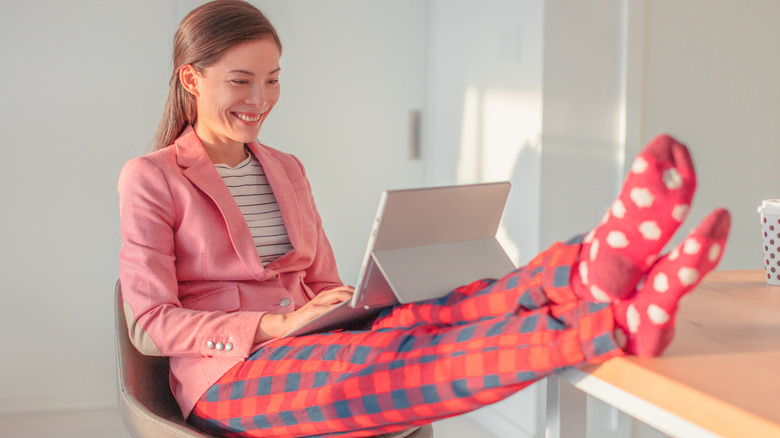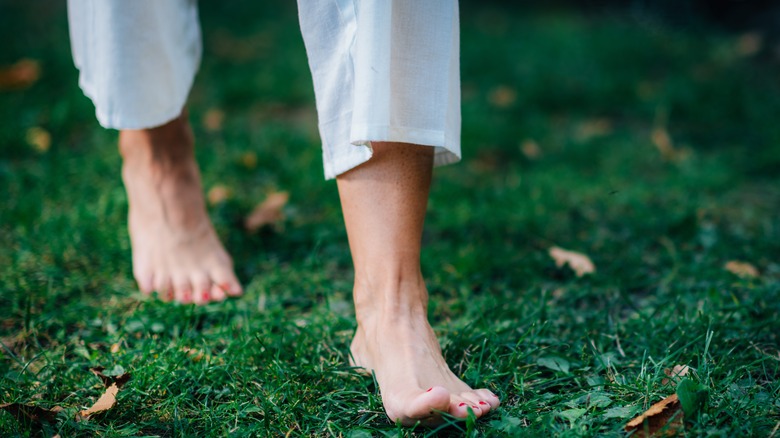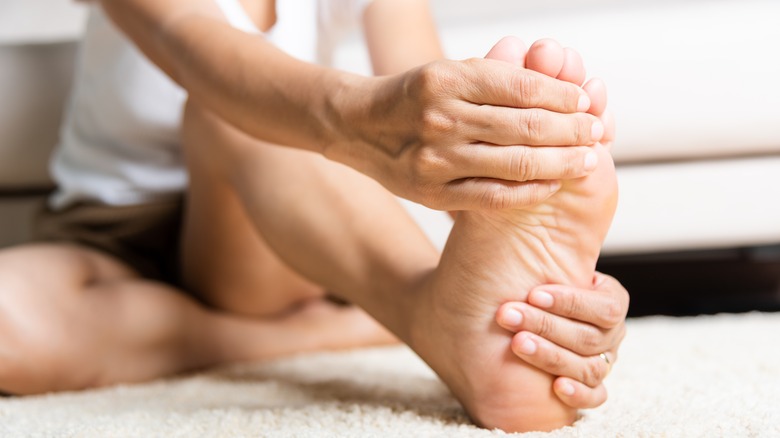What Really Happens To Your Feet When You Stop Wearing Shoes
In Western society, most of us grew up putting on our shoes at the start of every day. They can be used as protective gear for our feet, fashionable elements of our outfits, and even our entry access into stores with the policy "no shoes, no shirt, no service." However, like everything else, the pandemic completely shook up this everyday norm. With shelter-in-place orders keeping everyone at home, shoes were no longer an essential part of our day. Today, many jobs have remained remote, meaning many people are still not wearing their shoes as often as they used to.
Dana Canuso, D.P.M., a board-certified podiatrist and podiatric surgeon, told Shape that "Our home-based lifestyle has caused a significant change in the shoes we wear." She added that "Many of us have shifted from sneakers and boots to slippers and [being] barefoot, and this change significantly impacts many aspects of foot health." We don't really need to buy office footwear like high heels or trendy shoes as much anymore. Instead, people can stock up on comfy slippers and socks. However, as Canuso noted, this change largely affects your feet.
The benefits of going barefoot
There are other reasons people are embracing a barefoot lifestyle. Bruce Pinker, D.P.M., a New York–based board-certified podiatrist and foot surgeon, told Shape that "Many people will walk barefoot to be more connected to Mother Nature, and this connectedness can be therapeutic." According to a study published by The Journal of Inflammation Research, this practice, known as "grounding" or "earthing," has been shown to "improve sleep, normalize the day-night cortisol rhythm, reduce pain, reduce stress, ... [and] speed wound healing."
In addition, some foot specialists argue that barefoot walking and running can improve your foot health. Michael Bogden, PT, DPT, SCS, FAAOMPT, told Cleveland Clinic that "If you're always wearing supportive shoes, you're not adding muscular strength in your feet to support bones that aren't just naturally tight in their structure." Bogden suggested that by running without shoes, our feet find better placement, saying, "Overall, it's a more natural running pattern that reduces loading to your joints."
When it is better for you to wear shoes
Despite the many findings that encourage being barefoot, full-time shoelessness isn't the best option for everyone. Before you go chucking out your shoe collection, it's important to note that not all people will benefit from going barefoot. You might want to check out your foot type. In conversation with Shape, Dr. Canuso warned that "flat foot type[s] are predisposed to more injury from not wearing shoes since they're already lacking the support needed to promote a neutral foot position."
In addition, you'll want to be aware of any inflammatory conditions your feet may have. Saylee Tulpule, a podiatrist at Foot and Ankle Specialists of the Mid-Atlantic, listed some of the issues to look out for in an interview with HuffPost. Tulpule remarked that if her patients have "plantar fasciitis, Achilles tendonitis or metatarsalgia, [she'd] recommend patients wear an indoor house sandal or slipper to provide arch support, cushion in the ball of the foot and general comfort." As always, if you are experiencing moderate to severe pain in your feet, we recommend you consult a professional doctor to learn what's best for you.


